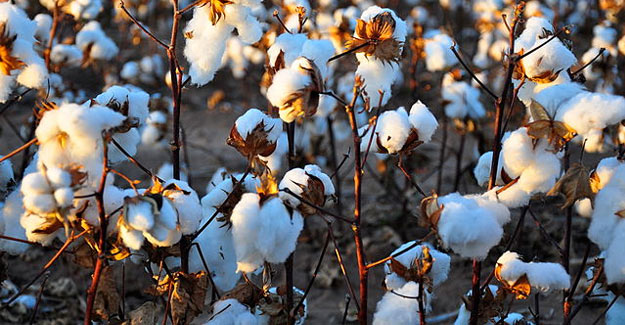
Pak More Likely To Bear The Brunt Than India In The Event Cotton Exports Are Hit
The ongoing face-off between India and Pakistan (if it escalates further into a war like situation), may take its toll on the cotton and cotton yarn trade between these two countries. While India imports miniscule quantity of cotton from Pakistan (100,000-3,00,000 bales of 170 kg each ; that too only during the slack cotton arrival period of the season), its hostile neighbour meets almost 10-15% (1.0-1.5 million bales) of its raw cotton requirement from India.
In fact, the last cotton season ended September 30, 2016. In this season, Pakistan imports were as high as 2.5 million bales of cotton from India due to shortage in cotton crop following pest attacks and untimely rains. This constituted over 20% of Pakistan’s cotton requirement, while for India the quantity was almost 35% its total cotton exports of around 7.0 million bales. In fact, Pakistan emerged as the second largest buyer of Indian cotton last year after Bangladesh (30 lakh bales). Till two years ago, China was the largest buyers of Indian cotton, buying over 60% of Indian fiber. But the new Chinese policy has brought down the imports by over 50%. In the last decade, following BT cotton cultivation and other efforts like Technology Mission on Cotton, India has emerged as net exporter of cotton from net importer. Though India has started exporting cotton, there have been concerted efforts to convert the same into cotton textiles for better realization in the value chain.
As per market sources, this year also Pakistan is likely to import a higher quantity of cotton due to lower estimation of crop. Cotton production in Pakistan is estimated to have fallen by 35% to around 9.7 million bales in the season of 2015-16. As against this, the Cotton Advisory Board (CAB) has pegged the production for the season of 2015-16 at 33.8 million bales for India, the second largest producer of cotton in the world. Pakistan is the world’s fourth largest cotton producer after China, India and the US.
In case, due to any eventuality, if Pakistan fails to procure this amount from India, it will have to resort to importing cotton from USA, Australia, Africa, Egypt or any other global markets and this will significantly add to their cost due to higher freight costs. It may be noted that spinners in Pakistan have been banking on the cost-effective cotton from India and in the recent times this dependency has only increased due to problems faced by the Pakistani spinning industry. While cotton exports from India attract “zero” duty due to surplus availability of the natural fibre here, Pakistan gets favourable treatment under the MFN status to which Indian exporters prioritise shipments.
“Any trade embargo or suspension of cotton imports from India to Pakistan will definitely impact the cotton textile industry in that country which of late is heavily depending upon Indian cotton to bridge its deficit. So far as India is concerned, this will not have much of impact on our cotton economy as we have large textile manufacturing base to absorb this aberration,” says J Thulasidharan, president, Indian Cotton Federation (ICF) and vice chairman, Confederation of Indian Textile Industry.
“Pakistan has been importing significant quantity of cotton from India. Any interruption on that front will adversely impact the local industry which is looking for the cheaper option from India. The textile industry in Pakistan, in case of any trade obstacle due to tension between the two countries, will have to look for alternative options which will obviously come at a cost,” states Rakesh Rathi, president, Indian Cotton Association.
M B Lal, a city-based cotton exporter and a former chairman of the Cotton Corporation of India believes that at this juncture when the Pakistani cotton crop is facing problem, the local industry over there will have to look for easier and cost effective import option, and India is the only country they can look for. “In my view, Pakistan’s cotton textile mills will have to face the brunt of importing pricy cotton from global market, something that the spinners in that country may not be ready in this competitive global scenario,” said Lal.
Market observers said, “So far there has been no alteration in business plans from both sides. The governments have been treading cautiously. Only when the governments decide upon something, the Indian cotton trade will take appropriate remedial measure. “
However, on cotton yarn export front, any trade disruption will have some impact on India which exports 40 million kg of cotton yarn (fine and super fine counts)l to Pakistan (FY2016). In fact, India exported around 3% of its total yarn exports to Pakistan. China with 44% share and Bangladesh with 14% share continue to be major buyers, even as share of China following its new cotton policy, has come down considerably in the last couple of years. Experts are of the view that any disruption, though marginal in nature, assumes significance at a time when the Indian domestic spinning industry has been faced with over capacity situation recently due to a large addition of new spindles in the last couple of years. For Pakistan, where spinners are already faced with challenges, it will again have to look for costlier option to fulfill it requirement of yarn for the downstream industry.
“Any trade disruption with Pakistan will have marginal impact on our cotton yarn exports. However, we are well prepared to mitigate such risks. Bangladesh and countries like Egypt are doing quite well for our yarn exports,” said Siddhartha Rajagopal, executive director, Cotton Textile Export Promotion Council (TEXPROCIL).
Textile Excellence
If you wish to Subscribe to Textile Excellence Print Edition, kindly fill in the below form and we shall get back to you with details.













